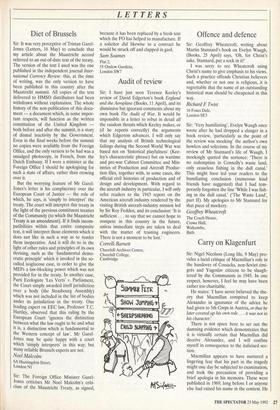LETTERS Diet of Brussels
Sir: It was very perceptive of Tristan Garel- Jones (Letters, 16 May) to conclude that my article about the Maastricht accord referred to an out-of-date text of the treaty. The version of the text I used was the one published in the independent journal Inter- national Currency Review: this, at the time of writing, was the only version to have been published in this country after the Maastricht summit. All copies of the text delivered to HMSO distributors had been withdrawn without explanation. The whole history of the non-publication of this docu- ment — a document which, in some impor- tant respects, will function as the written constitution of the United Kingdom both before and after the summit, is a story of dismal inactivity by the Government. Even in the final weeks before the summit no copies were available from the Foreign Office, and the only version to be had was a smudged photocopy, in French, from the Dutch Embassy. If I were a minister at the Foreign Office I should be apologising for such a state of affairs, rather than crowing over it.
But the worrying feature of Mr Garel- Jones's letter is his complacency over the European Court of Justice — the role of which, he says, is 'simply to interpret' the treaty. The court will interpret this treaty in the light of the previous constituent treaties of the Community (to which the Maastricht Treaty is an amendment). If it finds incom- patibilities within that entire composite text, it will interpret those elements which it does not like in such a way as to render them inoperative. And it will do so in the light of other rules and principles of its own devising, such as the 'fundamental demo- cratic principle' which it invoked in the so- called isoglucose case, in order to give the MEPs a law-blocking power which was not provided for in the treaty. In another case, Parti Ecologiste 'Les Verts' v. Parliament, the Court simply awarded itself jurisdiction over a body (the Strasbourg Assembly) which was not included in the list of bodies under its jurisdiction in the treaty. One leading expert on EEC law, Professor T.C. Hartley, observed that this ruling by the European Court 'ignores the distinction between what the law ought to be and what it is, a distinction which is fundamental to the Western concept of law'. Mr Garel- Jones may be quite happy with a court which 'simply interprets' in this way; but many reliable Brussels experts are not.
Noel Malcolm
6A Huntingdon Street, London Ni


































































 Previous page
Previous page